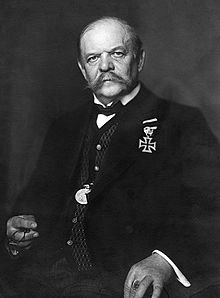
Max Liebermann von Sonnenberg (21 August 1848, Bielska Struga – 17 November 1911) was a German officer who became noted as an anti-Semitic politician and publisher. He was part of a wider campaign against German Jews that became a central feature of nationalist politics in Imperial Germany in the late nineteenth century.
Early life and education
| This section needs expansion. You can help by adding to it. (January 2024) |
Career
The foundation of the Christian Social Party by Adolf Stoecker in 1878 helped to galvanise anti-Semitic activity in Germany and brought Liebermann von Sonnenberg, then an officer in the German Imperial Army, to politics. He came to the fore in 1880 when he was central to the organisation of a petition calling for the removal of the Jews from all public positions. The petition attracted as many as 225,000 signatories.
Joining Bernhard Förster, the brother-in-law of Friedrich Nietzsche, he set up the Deutscher Volksverein (German People's League) in 1881 to support the anti-Semitic agenda. The group struggled for support as it focused on a single issue that spawned a number of movements at the time and it declined further when Förster left for Paraguay in 1886 to set up his ill-fated Nueva Germania project.
Following a June 1889 conference of anti-Semites in Bochum Liebermann von Sonnenberg set up his own political party, the Deutsch-Soziale Partei, which became the Deutschsoziale Reformpartei when it merged with Otto Böckel's Deutsche Reformpartei in 1894. Active co-operation had actually started at the 1890 election when a joint list captured five seats in the Reichstag. The two leaders however often found themselves in disagreement as Liebermann von Sonnenberg was basically a conservative whilst Böckel held a more radical world-view beyond his anti-Semitism, including a desire for land reform.
Liebermann von Sonnenberg undertook anti-Semitic lecture tours, although in 1892 he was forced to abandon one such tour after his credibility suffered a blow at the hands of Rabbi Benno Jacob. Delivering a two and a half hour lecture on the Talmud he was confronted at its conclusion by Jacob, bearing a copy of the Talmud and demanding Liebermann von Sonnenberg read out the passages he had referred to in his lecture. When Liebermann von Sonnenberg admitted that he could not read even a letter of the Hebrew language, Jacob chided him for speaking about a book which he could not even read and delivered an impromptu lecture of his own refuting the arguments previously advanced. After this pattern was repeated a few more times Liebermann von Sonnenberg was forced to cancel his tour.
His conservatism proved a problem for Liebermann von Sonnenberg when he purchased the newspaper Antisemitic Correspondence from Theodor Fritsch and promptly lost most of the readership after he dispensed with Fritsch's attacks on leading German figures and organised Christianity. Liebermann von Sonnenberg's only rhetoric in this vein was directed against Germany's Roman Catholic population when he questioned their patriotism by suggesting that every Catholic had "his feet in Germany but his head in Rome".
Liebermann von Sonnenberg was elected to the Reichstag and soon became noted for his attempts to introduce a bill to ban all Jewish immigration during every session of the Reichstag. His 1897 bill that sought to reintroduce denominational oaths in court cases was passed and represented the only occasion when a bill introduced by one of the anti-Semites was successful.
Personal life and death
| This section needs expansion. You can help by adding to it. (January 2024) |
von Sonnenberg continued to represent his constituency of Fritzlar until his death in 1911.
References
- Richard J. Evans (2004) The Coming Of The Third Reich, Penguin, p. 25, ISBN 1594200041
- ^ Jack Wertheimer (1991) Unwelcome Strangers: East European Jews in Imperial Germany, Oxford University Press, p. 31, ISBN 0195362152
- Karl Dietrich Bracher (1970) The German Dictatorship, Penguin, pp. 59–60, ISBN 0140137246
- Nicholas Goodrick-Clarke (2005) The Occult Roots of Nazism, I.B. Tauris & Co., p. 124, ISBN 1-86064-973-4
- Karl Dietrich Bracher (1970) The German Dictatorship, Penguin, p. 61, ISBN 0140137246
- Barnet Peretz Hartston (2005) Sensationalizing the Jewish Question: Anti-Semitic Trials and the Press in the Early German Empire, Brill, p. 245, ISBN 9004146547
- Walter Jacob (2007) The First Book of the Bible, Genesis, KTAV Publishing House, p. vii, ISBN 0881259608
- Richard S. Levy (2005) Antisemitism: A Historical Encyclopedia of Prejudice and Persecution, Volume 1, ABC-CLIO, p. 22, ISBN 1851094393
- Herbert Arthur Strauss (1993) Hostages of Modernization: Studies on Modern Antisemitism 1870-1933/39, Walter de Gruyter, p. 111, ISBN 3110107767
- Barnet Peretz Hartston (2005) Sensationalizing the Jewish Question: Anti-Semitic Trials and the Press in the Early German Empire, Brill, p. 68, ISBN 9004146547
- Herbert Arthur Strauss (1993) Hostages of Modernization: Studies on Modern Antisemitism 1870-1933/39, Walter de Gruyter, p. 147, ISBN 3110107767
- 1848 births
- 1911 deaths
- People from Tuchola
- People from the Province of Prussia
- German untitled nobility
- German Protestants
- German Social Party (German Empire) politicians
- German Social Reform Party politicians
- Members of the 8th Reichstag of the German Empire
- Members of the 9th Reichstag of the German Empire
- Members of the 10th Reichstag of the German Empire
- Members of the 11th Reichstag of the German Empire
- Members of the 12th Reichstag of the German Empire
- Prussian Army personnel
- German military personnel of the Franco-Prussian War
- Antisemitism in Germany
- Burials at the Invalids' Cemetery